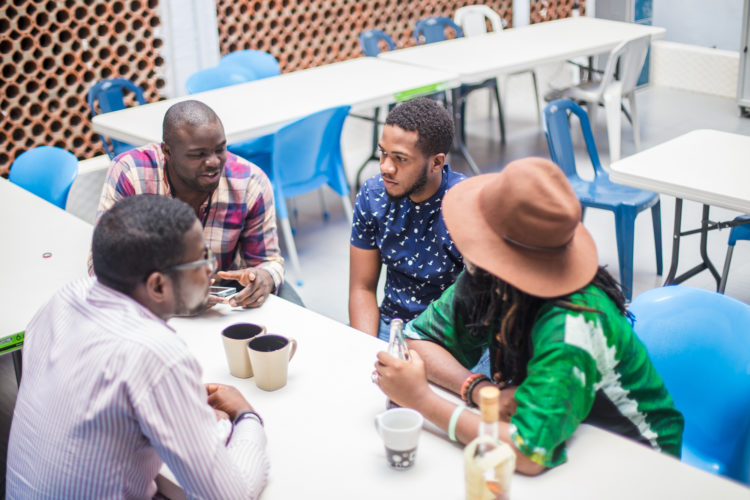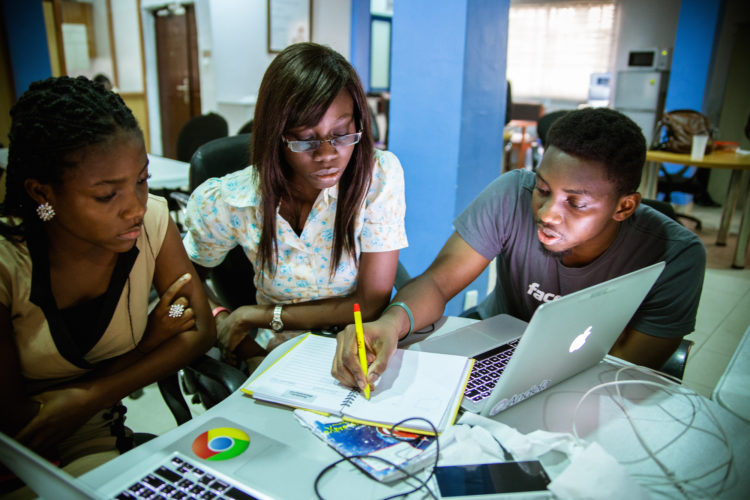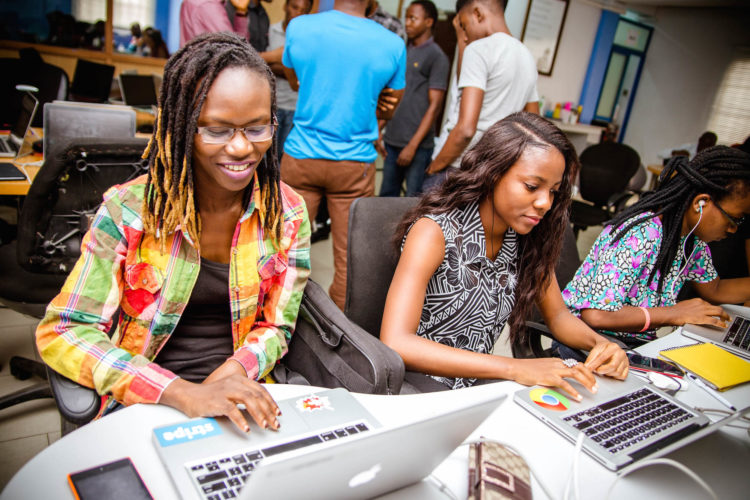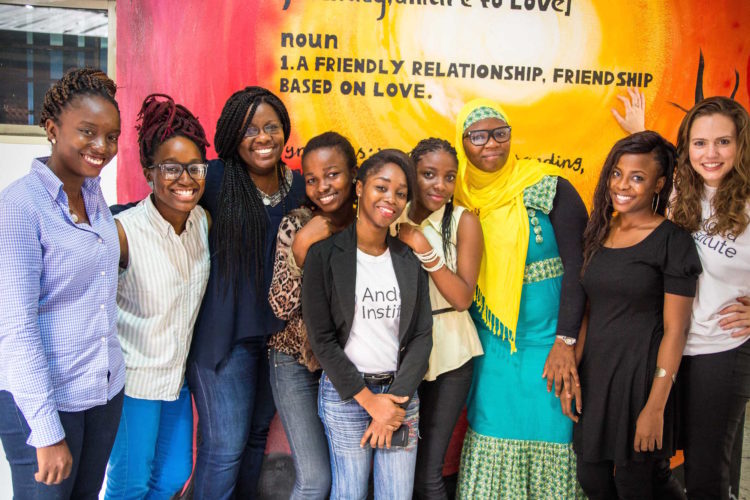When it was announced, in early June, that Mark and Priscilla Zuckerberg had led the USD$24 million investment round that is now fuelling the growth of Andela, all of a sudden everyone wanted to know what Andela was, what the company did, and what it was about the 25-year-old co-founder Iyinoluwa Aboyeji that justified such an important vote of confidence.
During that June week, several people called and emailed me about Andela, including two French journalists who cover the African tech scene. I told them that I had met Iyinoluwa three years ago, at a reception hosted by Harambe Entrepreneur Alliance founder Okendo Lewis Gayle at the Harvard Club in New York City. Harambe is a transnational network for promising young African students thinking of venturing into entrepreneurship.
After Iyinoluwa’s presentation, Okendo introduced Iyinoluwa to my business partner David Ly and me. At that time, David and I were still ideating on what would become TRUE Africa. I told Iyinoluwa that I’d enjoyed the way he’d presented his startup idea, and spoken clearly and convincingly, without seeming desperate, about his need for immediate startup capital.
I remember being struck and somewhat charmed by his sense of purpose.
He smiled, seemed pleased at the compliment, and I remember being struck and somewhat charmed by his sense of purpose. He was clearly a very driven young man who knew what he wanted and how he might get there, but there was a sparkle in his eyes that endeared him to me. (David later told me he had the same feeling about him.)
From Nairobi to Lagos to NYC we're excited to announce a $24M Series B from Zuckerberg's CZI https://t.co/ybRwkmN3lX pic.twitter.com/gtpzJymxNf
— Andela (@Andela) June 16, 2016
David and I then proceeded to listen to his full story and what we heard that evening was the tale of a budding entrepreneur who seemed determined to contribute to African development through technology. Iyinoluwa emailed me the next day, and we started corresponding around leads in African technology.
That evening at the Harvard Club, David and I spoke with another gentleman in the room, who told us he was a US-based South African executive working in finance. His name was Pule Taukobong and he was thinking of quitting his high paying job to focus, full time, on investing in African startups. He told us that Iyinoluwa’s venture idea was one that he was particularly impressed with.
Iyinoluwa and I stayed in touch via social media and a little more than a year later I ran into him again, at yet another Harambe event organised by Gayle. This time, the reception was held in one of the student meeting rooms on the campus of Harvard University.
#ThrowBack With my Ogas @PuleTaukobong @iaboyeji @yemiajao at the NYC official launch of @Andela in Sept 2014! pic.twitter.com/igcF2zidZk
— Idris Ayodeji Bello (@idrisayobello) June 20, 2016
Pule was one of the first people who spoke that evening, and while he was sharing his story, and promoting Africa Angels Network, his aptly-named new angel fund, I noticed that Iyinoluwa was very attentive. Essentially, Pule said that he was set to invest his entire savings, even selling his own house, in order to be able to support new ventures like Iyinoluwa’s. One could sense the sacrifice and the financial pain in every one of Pule’s words, but the speech was uplifting because of its optimism. Everyone could sense that he was one relatively inexperienced investor taking bets on a few unknown startups that had yet to prove the viability of their business models. Yet everyone was rooting for him and cheering him on.
Applications had jumped from 15,000 in 2015 to 40,000 this year and that the number of Andela fellows had doubled in the past year.
Last month, on June 18, less than a week after the Zuckerberg investment made headlines around the financial world, I reached out to Iyinoluwa again, and asked him how he felt about all the attention. We had a very interesting Skype conversation about a week later. There had been a couple of critical articles in the tech press, but I had heard of the growth of Andela, which, at its core, is essentially a highly competitive coding academy for young Africans who are interested in furthering their skills. I was told that applications had jumped from 15,000 in 2015 to 40,000 this year and that the number of Andela fellows had doubled in the past year.
Iyinoluwa spends most of his time in Lagos, but in the last couple of months he has been taking educational classes in Silicon Valley and in other parts of the US. He has been focused on business development courses as well as technology courses, mostly in the new fields that Andela is interested in entering.
.@andela is one the 10 NYC Startups That Raised the Most Amount of Capital in June https://t.co/yEjNZMmzvo via @AlleyWatch
— AlleyWatch (@AlleyWatch) July 1, 2016
I knew that he had struggled a lot in the first couple of years working on previous startups. So I asked him about the breakthrough with his co-founder, and now CEO, Jeremy Johnson (an EdTech wunderkind who had already taken a previous company public), and the moment they came across an idea that just two years later would be a growing company with real employees and real revenues as well as the talk of the continent’s tech scene.
‘One day, Jeremy and I met up in New York, and we started talking and thinking about what we could do next,’ he remembered. ‘We thought of a few things and then eventually we settled on what would become Andela. This new model around developing skills seemed to work really well from the start. And we realised that ultimately, it’s really about finding young people who are passionate about what they do, then optimising their learning environments, then monetising the skills that they’ve been able to acquire.’
Iyinoluwa feels that being on the ground is really important. Maybe that is why he spends so much time on the recruitment piece, working closely with Seni Sulyman, Director of Operations in Nigeria.
Seni, a Nigerian, only started his job at Andela in the first week of May 2016. I had actually met him two years ago when I spoke to his graduating class at Harvard Business School, in the spring of 2014. After class, Seni and I went to lunch in the school cafeteria and he told me about his post graduation plans.
When I met with Jeremy, and saw how committed he was, I remember thinking to myself that now it’s not just one crazy guy, Iyinoluwa, but four or five crazy people.
One of those plans was based around the idea of starting an African airline from scratch. During the process of starting the airline Seni realised that one of the biggest problems facing Africa was the issue of qualified human capital. ‘When I saw the human resources problems we have on the continent, I started missing the HBS environment, where people are constantly challenging things. I knew that that was one problem I could help solve, and I was determined to do it from an entrepreneurial angle.’
Proud to announce Andela's Series B from folks who know a little bit about quality software development… https://t.co/JksYOIPEr5
— Jeremy Johnson (@JeremyJ) June 23, 2016
Last year, Seni and Iyinoluwa sat down at the Four Points Hotel in Lagos, and Iyinoluwa told him about his plans for Andela. Nothing came of that meeting, but a few months later Iyinoluwa called him to tell him about the progress Andela was making. Seni had no idea the company had such big plans, and he took a chance on the opportunity when he flew to New York and met Jeremy. ‘When I met with Jeremy, and saw how committed he was, I remember thinking to myself that now it’s not just one crazy guy, Iyinoluwa, but four or five crazy people.’
Andela, which had expanded out of Lagos and opened an office in Nairobi, in addition to sales and marketing driven hubs in New York and San Francisco, is all about enrolling the very best young people that Africa has to offer. How do they do that? By inspiring more and more young Africans to apply. Now, they realise that one of the ways in which they can gain scale is by partnering with government. ‘These days,’ says Iyinoluwa, ‘when the Nigerian federal government calls, I’m the one they’re looking for.’
How, I asked him, did he become so driven and focused on the task at hand? ‘We are a very Christian family,’ he said. ‘We’ve always grateful for everything we get and achieve.’
Iyinoluwa Aboyeji was born in Lagos. When he was a child his family moved to Warri, a coastal town, and then to Abuja where he attended boarding school before moving again to Ibadan, where he worked with professors at the University of Ibadan before finding his way to Canada where he attended university.
From a very early age I knew that my whole life would be about helping to build the future of the African continent.
For the past few months I’ve been writing about, and interviewing ‘repats,’ those African returnees who choose to take their Western skills and education back to the continent as they pursue new opportunities. I’ve been told of all kinds of reasons for wanting to go back to Nigeria, and in Iyinoluwa’s case I felt I already knew the answer, but I went ahead and asked him if a career in Canada was something he’d ever considered. ‘At one point, early on, I might have, but returning to Lagos was a foregone conclusion. Even though at the time the game was to stay in Canada long enough to get permanent residency, by the second year I knew that I was going back.’
https://twitter.com/iaboyeji/status/749394546400780289
Iyinoluwa’s elder brother is an actuary in Toronto; he has another sister in Toronto; and his younger brother is thinking of pursuing a career in law, government and business.
I asked him what kind of 30-year-old he imagined himself to be. ‘Me and my mom we have different answers to that question,’ he answered, laughing. ‘From a very early age I knew that my whole life would be about helping to build the future of the African continent. What Steve Jobs said really resonated with me. He said something like, look around you, everything you see was built by somebody who was no smarter than you. I think about that and I get inspired by the idea of building societies and taking them to another level. Other continents have done it and I don’t see why we cannot do that even faster in Africa.’
Talking to Iyinoluwa, it seemed that he was very much looking forward to the future. ‘The next five years will be about taking on even more challenges on the continent,’ he said at the end of the interview. ‘I want to be part of that mix.’
Find out more at andela.com





